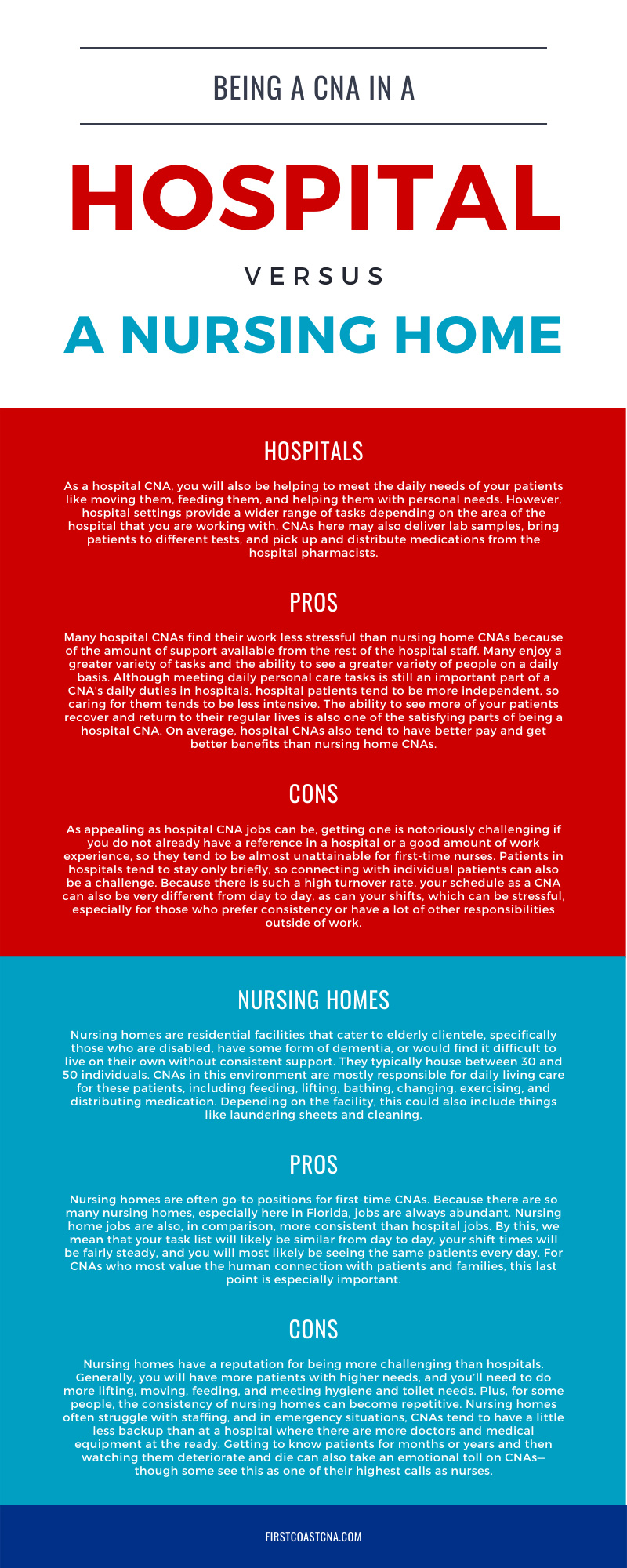CNA in a Hospital or a Nursing Home?
Becoming a CNA is sort of like one of those “Choose Your Own Adventure” novels. For those who don’t remember these books (which is probably more than those who do), in the novels, everyone starts the story in the same place and in the same way, but as you read the story, you reach points where you get to make a choice—to go right or left, to stay or run away, etc. Each choice leads you through a very different story.
As a CNA, you will start with the same training as all your fellow certified nursing assistants, but then you, too, will have to make a choice about where you want to take your skills. For many of you, that choice will be between being a CNA in a hospital vs. a nursing home. Fortunately, unlike in a “Choose Your Own Adventure” novel, you can know a few things about both paths before you choose one.
CNA in Nursing Homes
Nursing homes are residential facilities that cater to elderly clientele, specifically those who are disabled, have some form of dementia, or would find it difficult to live on their own without consistent support. They typically house between 30 and 50 individuals. CNAs in this environment are mostly responsible for daily living care for these patients, including feeding, lifting, bathing, changing, exercising, and distributing medication. Depending on the facility, this could also include things like laundering sheets and cleaning.
Pros
Nursing homes are often go-to positions for first-time CNAs. Because there are so many nursing homes, especially here in Florida, jobs are always abundant. Nursing home jobs are also, in comparison, more consistent than hospital jobs. By this, we mean that your task list will likely be similar from day to day, your shift times will be fairly steady, and you will most likely be seeing the same patients every day. For CNAs who most value the human connection with patients and families, this last point is especially important.
Cons
Nursing homes have a reputation for being more challenging than hospitals. Generally, you will have more patients with higher needs, and you’ll need to do more lifting, moving, feeding, and meeting hygiene and toilet needs. Plus, for some people, the consistency of nursing homes can become repetitive.
Nursing homes often struggle with staffing, and in emergency situations, CNAs tend to have a little less backup than at a hospital where there are more doctors and medical equipment at the ready. Getting to know patients for months or years and then watching them deteriorate and die can also take an emotional toll on CNAs—though some see this as one of their highest calls as nurses. Nursing home CNAs also tend to make less money and have fewer benefits than hospital nurses.
CNA in Hospitals
As a CNA in a hospital, you will also be helping to meet the daily needs of your patients like moving them, feeding them, and helping them with personal needs. However, hospital settings provide a wider range of tasks depending on the area of the hospital that you are working with. CNAs here may also deliver lab samples, bring patients to different tests, and pick up and distribute medications from the hospital pharmacists.
Pros
Many CNA in a hospital find their work less stressful than nursing home CNAs because of the amount of support available from the rest of the hospital staff. Many enjoy a greater variety of tasks and the ability to see a greater variety of people on a daily basis. Although meeting daily personal care tasks is still an important part of a CNA’s daily duties in hospitals, hospital patients tend to be more independent, so caring for them tends to be less intensive.
The ability to see more of your patients recover and return to their regular lives is also one of the satisfying parts of being a CNA in a hospital. On average, CNA in a hospital also tend to have better pay and get better benefits than nursing home CNAs.
Cons
As appealing as hospital CNA jobs can be, getting one is notoriously challenging if you do not already have a reference in a hospital or a good amount of work experience, so they tend to be almost unattainable for first-time nurses. Patients in hospitals tend to stay only briefly, so connecting with individual patients can also be a challenge. Because there is such a high turnover rate, your schedule as a CNA in a hospital can also be very different from day to day, as can your shifts, which can be stressful, especially for those who prefer consistency or have a lot of other responsibilities outside of work.
How to Choose
So how do we choose the path for our CNA adventure? There’s no difference in the Florida CNA requirements between being a CNA in a hospital vs. a nursing home. Your training will adequately prepare you for either option. Ultimately, your choice should depend on your own preferences and what you want out of your nursing career.
Ask yourself a few questions: Is interacting with individual families and connecting with people going through the most difficult times in their lives important to you personally? Or would you rather affect many different lives and help people with a variety of issues? Does your current life situation make you more inclined toward a steadier work schedule, or would you rather have a lot of variety in your day to day routine?
It’s also important to note that wherever you choose, there will be a lot of variation depending on the facility or hospital where you decide to work. For nursing homes, privately and commercially owned homes can be very different from each other, and different companies and owners may have different levels of funding, resources, and ideas for patient care. CNA life in hospitals can also vary quite a bit depending on the size and type of hospital, whether it’s private or federally funded, and what it specializes in, such as long-term care, rehabilitation, or psychiatrics. Even within an individual hospital, things may be very different depending on the ward you are working in.
At the end of the day, no option is inherently better than the other. Each CNA role has its benefits and defects, and each role is essential in improving peoples’ lives. The choice is up to you.
Want more information? Click here for a comprehensive article on Indeed.com

